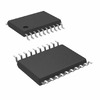Manufacturer Part Number
MM74HC574WM
Manufacturer
onsemi
Introduction
The MM74HC574WM is a high-performance D-Type logic flip-flop with tri-state non-inverted outputs, designed for use in various applications requiring precise and reliable digital storage and output.
Product Features and Performance
D-Type Flip Flop
Tri-State, Non-Inverted Outputs
Single Element with an 8-bit width
Maximum Clock Frequency: 35 MHz
Maximum Propagation Delay: 27 ns at 6V, 150pF
Positive Edge Trigger
Operating Temperature Range: -40°C to 85°C
Surface Mount 20-SOIC Package
Product Advantages
High-speed operation with a maximum clock frequency of 35 MHz
Low Power Consumption with a quiescent current of 8 µA
Supports broad voltage supply range from 2V to 6V
Operational in a wide temperature range ensuring reliability under extreme conditions
Key Technical Parameters
Outputs: Tri-State, Non-Inverted
Number of Elements: 1
Bits per Element: 8
Clock Frequency: 35 MHz
Propagation Delay: 27 ns @ 6V, 150pF
Output Current: 7.8 mA (High, Low)
Voltage Supply: 2V ~ 6V
Quiescent Current: 8 µA
Input Capacitance: 5 pF
Quality and Safety Features
Designed for stringent operational reliability over extensive temperature ranges (-40°C to 85°C)
Robust construction suitable for surface mounting, providing secure and durable placements
Compatibility
Compatible with a range of digital systems requiring 2V to 6V voltage supply
Application Areas
Digital data storage
Consumer electronics
Computing systems
Communication devices
Product Lifecycle
The product is labeled as "Obsolete" indicating nearing discontinuation. Users are advised to check for available replacements or upgrades.
Several Key Reasons to Choose This Product
Capacity to maintain stability and performance within a broad range of operational conditions
Low power usage facilitating efficient designs
Flexible compatibility with various digital systems due to its wide voltage range and operational temperature
High frequency operation enables use in high-speed applications
Obsolete status presents a consideration for unique or legacy system requirements where exact replacement may be necessary





 MM74HC589MonsemiIC SHIFT REGISTER 8-BIT 16-SOIC
MM74HC589MonsemiIC SHIFT REGISTER 8-BIT 16-SOIC MM74HC594MXFairchild SemiconductorSERIAL IN PARALLEL OUT
MM74HC594MXFairchild SemiconductorSERIAL IN PARALLEL OUT